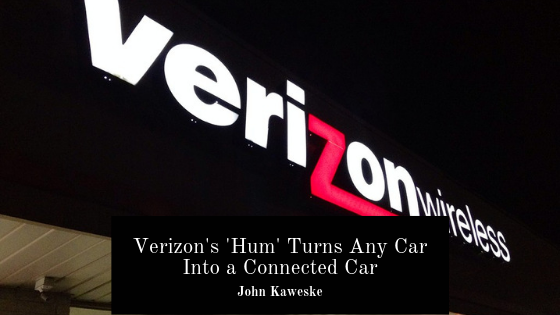Most modern cars come with a service like OnStar, ready to help out the second your car runs into engine trouble or you get into an accident. Most services these days are capable of sending your phone push notifications on the status of your vehicle before anything even goes wrong. But if it does, help is just a button away.
It’s a useful service, and a key selling point for new vehicles. But you’re pretty much out of luck if you drive an older car or one from an automaker who for some reason hasn’t hopped on the connected car bandwagon. While the market of unconnected cars continues to shrink as universal adoption becomes eminent, for the moment it’s still a huge untapped market with approximately 150 million unconnected vehicles still on the road.
Verizon recognized this market as a huge opportunity and in doing so decided to launch Hum, a service that taps your car’s on-board diagnostic port and transmits technical information through a Bluetooth-enabled speaker clipped to your visor. It works with most cars (electrics and diesels excluded) and any carrier. It also costs just 15 bucks a month. Sounds pretty sweet, right?
The Hum service collects data on a range of information, including fuel economy, battery charge level, transmission coolant temperature, and engine error codes. It relays that info to the cloud where your iPhone or Android app can notify you if anything seems to be out of place. If your car has an error code, the app doesn’t just bring it to your attention. It will explain what it means, recommend repairs, and even provide a cost estimate. If something more complex happens, a hotline will connect you to a mechanic to diagnose the problem.
Verizon wants customers to be able to use this technology to avoid breakdowns by identifying problems before they leave you stranded. But, if something unexpected happens, the $15 monthly subscription fee also includes roadside assistance.
The service also includes features for if your ride ever gets stolen, including GPS and data from the OBD that can help locate the car. Information on stolen vehicles is only made available to the police, to prevent owners from potentially harmful confrontations with thieves. Hum can also remind you where you parked the car and when your meter is set to expire. Verizon wants to pull out all the bells and whistles other connected car technology provides for newer cars.
The main draw for most people to OnStar and Hum alike though is safety. Like OnStar, Hum will call you in the event of an accident and make sure you’re OK. If you don’t respond, it will call 911 for you. There’s also a panic button you can push to call 911 yourself.
Any time you have a third party accessing information about your driving habits, privacy questions arise. Verizon, of course, says it will vigorously protect your data, sharing it with third parties only in cases where its needed to provide services like roadside assistance. They also say they will only share data with law enforcement “where authorized and required by law.”
“We take privacy very seriously,” says Andres Irlando, CEO of Verizon Telematics. “We’ve built the service with that in mind.”
Hopefully that brings some comfort, but it’s always important to keep in mind that like most connected services, there is no way to easily erase your data.
